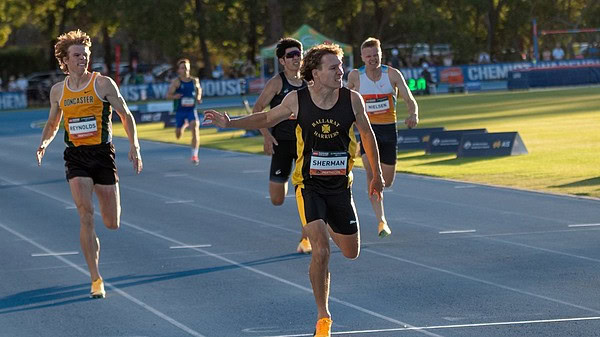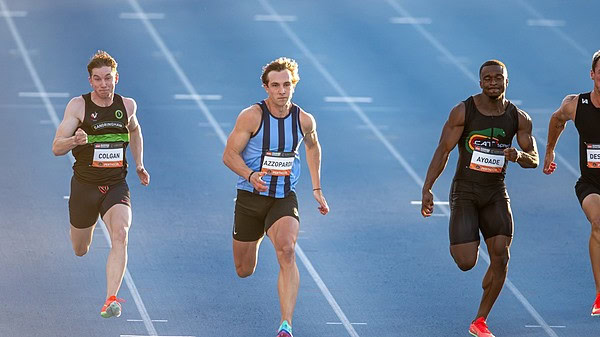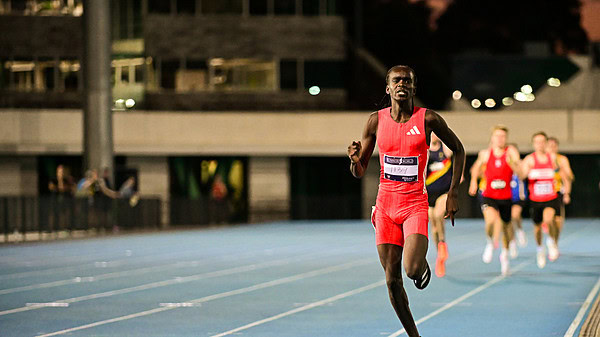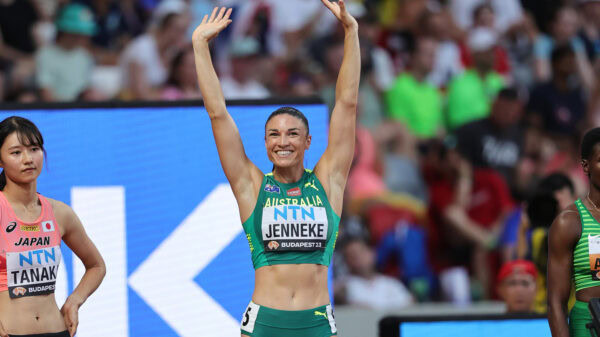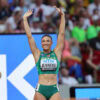Australia has recorded its best global championship result since the 1968 Olympic Games in Mexico City, winning six medals at the recent World Championships in Budapest.
Photos courtesy of Athletics Australia / Fred Etter
Nina Kennedy was crowned world champion in the pole vault, while silver medals were won by Jemima Montag and Eleanor Patterson and bronzes to Nicola Olyslagers, Mackenzie Little and Kurtis Marschall.
“We couldn’t be more proud or impressed by our team and their performances this week. Claiming six medals was terrific but equally great was having so many finalists and semi-finalists, showing that our team is really on track for our most successful Olympic Games since 1968,” said Andrew Faichney, Athletics Australia’s General Manager – High Performance.
“Our team has made history this week in claiming more medals than we ever have before, but what excites me is their potential in Paris. At Mexico 1968, we won six medals by some of the country’s greatest athletics stars including Ralph Doubell, Pam Kilborn, Peter Norman, Raelene Boyle, Maureen Caird and Jenny Lamy. This team has the potential to be as successful and inspire the nation in the same way as some of those athletes did back then.”
Kennedy shares pole vault gold

Nina Kennedy’s win was shared with reigning World and Olympic champion Katie Moon from the USA. Equal after each making third attempt clearances at 4.90m, with a miss each at earlier heights, 4.95m was too much of an asking.
4.90m was a personal best – and national record – for Kennedy (as was her 4.85m clearance). Moon’s PB is 4.95m. With 12 and 11 jumps each already in the competition and not being able to be separated on count back, a choice was to be made: to keep jumping (with the bar being raised and lowered until a winner emerges), or not.
In the vertical jumps its often remarked that an athlete’s competition usually ends in failure. “Hey girl, you maybe want to share this?” was the question from Moon to Kennedy. The answer was clear. 
“It is unbelievable. It’s a huge honour to share this gold with Katie. It shows that dreams really do come true,” Kennedy said.
“Last year I didn’t really believe that I belonged on the podium but tonight I was going for gold and really, deep down, I believed in myself and came up with the goods.
“I have been planning the competition in my head for so many months now, it’s such a battle. Katie is the Olympic champion, she’s the world champion and she’s honestly one of the greatest in the sport, so to share it with her is an honour and a privilege and will mean that we’ll be connected forever.
“When we were equal, we were both looking at each other. I didn’t think she was going to want to share it. I said to her, “hey girl, you maybe want to share?” You could see the relief come over her face, and she was like, “yes!” and then we both started crying.”
The scene was similar to the Tokyo Olympics high jump where Gianmarco Tamberi and Mutaz Barshim shared gold. It wasn’t without criticism, which Moon eloquantly addressed on social media. “To walk away healthy and with a gold medal, while celebrating with my friend that had jumped just as well, was a no-brainer. Part of the reason we’ve reached the highest level is by listening to our bodies, and knowing our limitations. We decided that in this particular moment, sharing glory was just as good as earning it outright. I understand that people want to see a clear winner. It is the exciting part of sport. But in this instance, it was without a doubt the right decision, and one that I will never regret. Contrary to popular belief, you do not need a “win at all cost” mindset to have a champion’s mentality.”Katie Moon
Less than a week later, as part of the Zurich Diamond League meet, Nina Kennedy bettered her PB and national record by a centimetre, winning in 4.91m. The event was held within Zurich’s main train station.
A week after the biggest moment in her career in Budapest, Nina Kennedy displayed amazing focus to win the Diamond League women’s vault in Zurich Train Station last night with another national record – 4.91m! pic.twitter.com/09c3R5YXWR— Brian Roe (@Doctor_Roe) August 31, 2023
Patterson and Olyslagers both jump 1.99m to claim podium places

Eleanor Patterson and Nicola Olyslagers’s high jump feats – each clearing 1.99m and only being separated on a count back for silver and bronze medals – was the first time Australia had won two medals in the same event in World Championship history. It’s a rare feat in the nation’s history in the sport, occurring 7 times at the Olympics (and always by women) in:
- 1968 – 200m: Raelene Boyle and Jenny Lamy; and 80m hurdles: Maureen Caird and Pam Ryan
- 1964 – 400m: Betty Cuthbert and Judy Pollock
- 1956 – 100m and 200m: Betty Cuthbert and Marlene Matthews; and 80m hurdles: Shirley Stickland and Norma Thrower
- 1952 – 100m: Marjorie Jackson and Shirley Strickland
The competition was taken out by Yaroslave Mahuchikh from the Ukraine at 2.01m.
It was a story of recovery and resilience for reigning champion Patterson, who five months ago was on crutches following injury in the indoor season. For Olyslagers, who came into the competition with the equal world lead at 2.01m, it was another global medal to add to her Olypic silver.
“It was a very wild, incredible night and a tough competition.Eleanor Patterson

“It was a very wild, incredible night and a tough competition. I definitely put my back up against the wall but I am incredibly proud of the performance tonight and of Nicola and Yaroslava as well,” Patterson said.
“Having third attempt clearances was showing I didn’t have many comps under my belt and yeah, I made it tough for myself but I am just incredibly proud that I was able to push through and come away with a 1.99 and a season best.
“I am so proud of Nicola as well, I knew we could get on the podium. I often go in thinking I just want to jump a PB or jump high and Nicola is often doing similar. To really push each other is an incredible thing and what we have on home soil is wonderful, she is a beautiful human being and obviously an incredible athlete.”
Marschall ties for bronze in pole vault

Despite a shaky start, missing his opening attempt at 5.55m, Kurtis Marschall was clean when it mattered, with a first attempt clearance at a PB equalling 5.95m securing bronze with American Christopher Nilsen.
Mondo Duplantis was again peerless, with the world record holder clearing 6.10m for the win before taking three unsuccessful attempts at a new world record of 6.23m. The magical six metre barrier – bettered by only 28 men in history (including 3 Australians: Steve Hooker, Dmitri Markov and Paul Burgess) – was what was required for silver, with the Phillipines’ Ernest Obiena clearing that on his second attempt while Marschall and Nilsen bowed out.
“It has been a while since we’ve won a men’s pole vault medal in Australia,” said Marschall, who is a training partner of Nina Kennedy under coach Paul Burgess.
“”Nina is obviously doing amazing at the moment and I’m trying to copy what she’s doing. She got a bronze last year, I got a bronze this year. She got a gold this year… you never know what is going to happen next year!” Marschall said at the post-event press conference as he sat by Duplantis.
“It’s awesome to come from such a rich heritage in Australia. It’s been an awesome season as well. It’s been a break-out season even if I haven’t quite got that six-metre bar yet but we’re young and have many years ahead of us.”
Last ditch for Little secures bronze

It’s fair to say that Mackenzie Little thrives on pressure. The 26-year-old is in the form of her career, with a 65.70m personal best in July ranking her third in the field on season’s bests, and building on Olympic and world championship finals in the previous two years.
After the first three rounds Little sat in fifth with a 61.41m best. She improved her mark, but not position, in the fifth round with a 61.66m throw. 63.00m was holding down third place (Japan’s Haruka Kitaguchi).
Throwing in reverse order in the final round (as also happens after the first three rounds) means chasing a mark. For Little, who has been globetrotting to international events and back to her medical studies, chasing results is something she’s well practiced at.
No changes from the three athletes prior to her throw. Fifth locked in, and equalling her 2022 World Championship result from Oregon.
Boom – 63.38m and into the silver medal position.
Then comes Austria’s Victoria Hudson – fourth and the beginning of the round but now fifth. No improvement from her with a throw under 60 metres.
Kitaguchi, in the medals at the beginning of the round but now in fourth… a huge 66.73m throw to move into the gold medal. It’s further than any other athlete except her has thrown all season.
Just one to go for Little to secure her first global medal… Latvia’s Anete Kocina. She was in bronze at the beginning of the round having thrown 63.18m and needs to find another 20 centimetres to get back ahead of Little. It’s a good throw, but 62.02m.
Bronze secured for Mackenzie Little.
Only Columbia’s Flor Denis Ruiz Hurtado could change the ordering in the first two places, but her first round throw of 65.47m remaind her best of the competition with a 60.97m mark in the last round.
READ MORE: Balancing act for Little lands bronze
Montag marches to silver in new national record

Tenth in her world championships debut in Doha in 2019. Sixth in the Tokyo Olympics two years later. And fourth last year in Oregon. Jemima Montag was tracking on the right trajectory for success in Budapest, and had developed not just the strength and fitness to succeed, but also the wisdom.
Endurance events are tricky enough in trying conditions. Budapest was 26 degrees but with a high 72% humidity. Then add in the complications of the walk – a technique based event where breaching of the rules can result in red cards, a time out in the penalty zone, and even disqualification – knowing when to make moves is of critical importance.
Eventual winner Maria Perez of Spain (who also took out the 35km walk) surged to a decisive lead at the 16km mark, winning in 1:26:51. She’s a few steps better than Montag and the rest of the world at the moment.
“I didn’t really have any intention of challenging her (Perez),” Montag said.
“And I knew I was on one red card. So it’s smarter to lock in silver, and keep that distance back to bronze than to worry about challenging for gold and potentially getting disqualified.”
“I’ve learned from the last few World Champs and the Olympics that when the move is made at about 15km, it’s the winning move. The last three majors I haven’t had the training evidence or the self-belief, or the technical backing to go with it but when speaking to my psych the last few days, the idea was just to be willing to hurt in that last five.”
Montag’s 1:27:16 improved on her 1:27:51 personal best set earlier in the year and surpassed Jane Saville’s national record of 1:27:44 set back in 2004.
National record to Denny and PBs to Caldwell and Feain-Ryan

Joining Kennedy and Montag in setting national records, was discus thrower Matt Denny, who threw 68.24m to surpass Benn Harradine’s mark. Denny was again agonisingly close to a medal after 4th and 6th places at previous World Championships and 4th at the Olympic Games, finishing 61cm short of third. 
Abbey Caldwell ended up in the deepest 1500m semi-final in history, breaking four minutes for the first time in her career with a 3:59.79 clocking. Unfortunately it only secured ninth place with the first six progressing to the final. A few days later a 1:59.05 800m run in the semi-finals left her just one place and six-hundredths-of-a-second short of a finals berth: a sensational global championship debut for the 22-year-old. 
Jessica Hull raced well in Caldwell’s 1500m semi, claiming sixth place to 3:57.85 to take a place in the final. A 3:59.54 run in the final secured seventh place. Declan Tingay (20km Walk, 1:18:30) and Brandon Starc (High Jump, 2.25m) both claimed 8th place finishes. 
In the 3000m steeple World University Games gold medallist Cara Feain-Ryan recorded a new personal best of 9:29.60 in her heat, finishing 20th overall.
Strong performances were recorded across the team, 59% of athletes recording a place better than their seeding (based on season bests prior to the meet). 
Australian Results at the 2023 World Championships in Budapest
| Name | Event | Final Result | Place | Seeding | Difference |
|---|---|---|---|---|---|
| Rohan Browning | 100m | 10.11 SF | 14 | 25 | 11 |
| Jake Doran | 100m | 10.48 R1 | 47 | 50 | 3 |
| Torrie Lewis | 100m | 11.45 R1 | 39 | 44 | 5 |
| Bree Masters | 100m | 11.43 R1 | 36 | 44 | 8 |
| Aidan Murphy | 200m | 20.90 R1 | 42 | 49 | 7 |
| Ella Connolly | 200m | DNS | n/a | 38 | n/a |
| Joseph Deng | 800m | 1:48.12 R2 | 24 | 9 | -15 |
| Peter Bol | 800m | 1:46.75 R1 | 28 | 12 | -16 |
| Riley McGown | 800m | 1:48.38 R1 | 47 | 49 | 2 |
| Catriona Bisset | 800m | 1:59.94 SF | 14 | 6 | -8 |
| Abbey Caldwell | 800m | 1:59.05 SF | 9 | 8 | -1 |
| Ellie Sanford | 800m | 2:03.55 R1 | 55 | 42 | -13 |
| Stewart McSweyn | 1500m | 3:36.01 R1 | 33 | 15 | -18 |
| Matthew Ramsden | 1500m | 3:36.83 SF | 21 | 45 | 24 |
| Adam Spencer | 1500m | 3:42.10 SF | 27 | 18 | -9 |
| Linden Hall | 1500m | 4:03.96 SF | 19 | 6 | -13 |
| Jessica Hull | 1500m | 3:59.54 F | 7 | 7 | 0 |
| Abbey Caldwell | 1500m | 3:59.79 (PB) SF | 15 | 16 | 1 |
| Stewart McSweyn | 5000m | 13:42.58 R1 | 13 | 39 | 26 |
| Morgan McDonald | 5000m | 13:26.58 F | 32 | 40 | 8 |
| Jessica Hull | 5000m | 15:15.89 R1 | 26 | 15 | -11 |
| Rose Davies | 5000m | 15:07.93 R1 | 19 | 28 | 9 |
| Lauren Ryan | 5000m | 15:40.23 R1 | 34 | 31 | -3 |
| Jacob McCorry | 110m H | 13.67 R1 | 28 | 33 | 5 |
| Nick Andrews | 110m H | 13.92 R1 | 39 | 46 | 7 |
| Michelle Jenneke | 100m H | 12.80 SF | 14 | 19 | 5 |
| Celeste Mucci | 100m H | 12.97 SF | 19 | 29 | 10 |
| Hannah Jones | 100m H | 13.05 R1 | 31 | 41 | 10 |
| Sarah Carli | 400m H | 55.76 R1 | 25 | 22 | -3 |
| Matthew Clarke | 3000m St | 8:40.92 R1 | 35 | 36 | 1 |
| Amy Cashin | 3000m St | 9:31.07 | 23 | 34 | 11 |
| Cara Feain-Ryan | 3000m St | 9:29.60 (PB) R1 | 20 | 35 | 15 |
| Brielle Erbacher | 3000m St | 9:57.11 | 32 | 36 | 4 |
| Liam Adcock | Long Jump | 7.99m R1 | 14 | 20 | 6 |
| Christopher Mitrevski | Long Jump | 7.99m R1 | 13 | 34 | 21 |
| Henry Frayne | Long Jump | 7.78m R1 | 20 | 38 | 18 |
| Brooke Buschkuehl | Long Jump | 6.55m R1 | 17 | 22 | 5 |
| Samantha Dale | Long Jump | 6.35m R1 | 29 | 30 | 1 |
| Aiden Hinson | Triple Jump | DNS | n/a | 30 | n/a |
| Julian Konle | Triple Jump | NM R1 | n/a | 33 | n/a |
| Joel Baden | High Jump | 2.14m R1 | 32 | 7 | -25 |
| Brandon Starc | High Jump | 2.25m F | 8 | 14 | 6 |
| Nicola Olyslagers | High Jump | 1.99m F | 3 | 1 | -2 |
| Eleanor Patterson | High Jump | 1.99m F | 2 | 10 | 8 |
| Erin Shaw | High Jump | 1.80m R1 | 29 | 29 | 0 |
| Kurtis Marschall | Pole Vault | 5.95m F | 3 | 4 | 1 |
| Nina Kennedy | Pole Vault | 4.90m F | 1 | 6 | 5 |
| Matt Denny | Discus | 68.24m (NR) F | 4 | 12 | 8 |
| Taryn Gollshewsky | Discus | 58.63m R1 | 20 | 27 | 7 |
| Stephanie Ratcliffe | Hammer Throw | 69.87m R1 | 18 | 13 | -5 |
| Cameron McEntyre | Javelin | 78.10m R1 | 19 | 29 | 10 |
| Mackenzie Little | Javelin | 63.38m F | 3 | 3 | 0 |
| Kelsey-Lee Barber | Javelin | 61.19m F | 7 | 9 | 2 |
| Kathryn Mitchell | Javelin | DNS F | 12 | 14 | 2 |
| Daniel Golubovic | Decathlon | 8141p | 12 | 14 | 2 |
| Cedric Dubler | Decathlon | DNF | n/a | 18 | n/a |
| Ashley Moloney | Decathlon | DNF | n/a | 22 | n/a |
| Lisa Weightman | Marathon | 2:30:50 | 16 | 9 | -7 |
| Isobel Batt-Doyle | Marathon | 2:37:53 | 43 | 31 | -12 |
| Sarah Klein | Marathon | 2:27:31 | 41 | 46 | 5 |
| Declan Tingay | 20km Walk | 1:18:30 (PB) | 8 | 5 | -3 |
| Kyle Swan | 20km Walk | 1:26:02 | 40 | 12 | -28 |
| Rhydian Cowley | 20km Walk | 1:19:31 | 14 | 17 | 3 |
| Jemima Montag | 20km Walk | 1:27:16 (NR) | 2 | 8 | 6 |
| Rebecca Henderson | 20km Walk | 1:35:51 | 32 | 12 | -20 |
| Olivia Sandery | 20km Walk | DQ | n/a | 13 | n/a |
| Rhydian Cowley | 35km Walk | DNF | n/a | 10 | n/a |
| Rebecca Henderson | 35km Walk | DNS | n/a | 11 | n/a |
| Allanah Pitcher | 35km Walk | 2:57:55 | 21 | 15 | -6 |
| Women | 4x100m | DNF | n/a | 11 | n/a |



